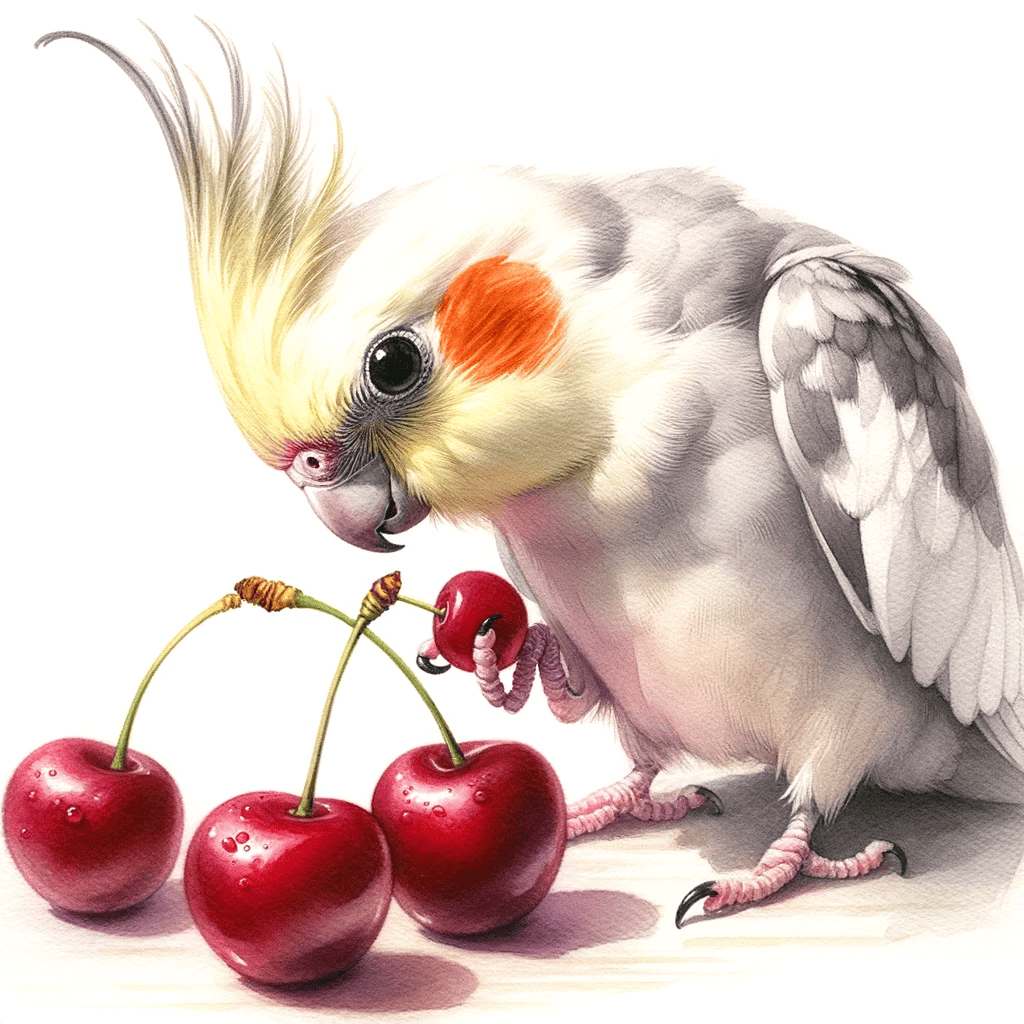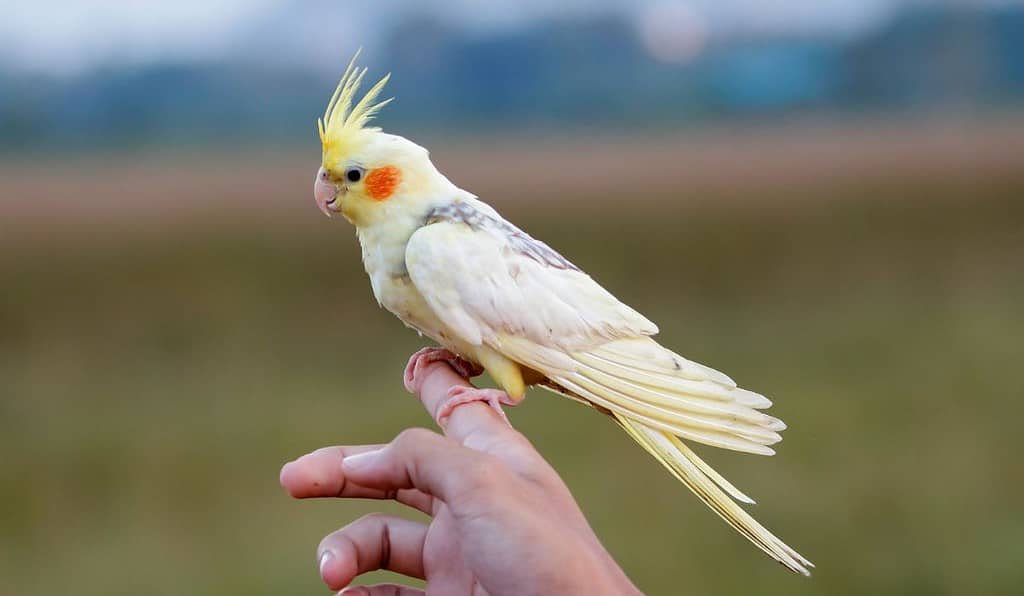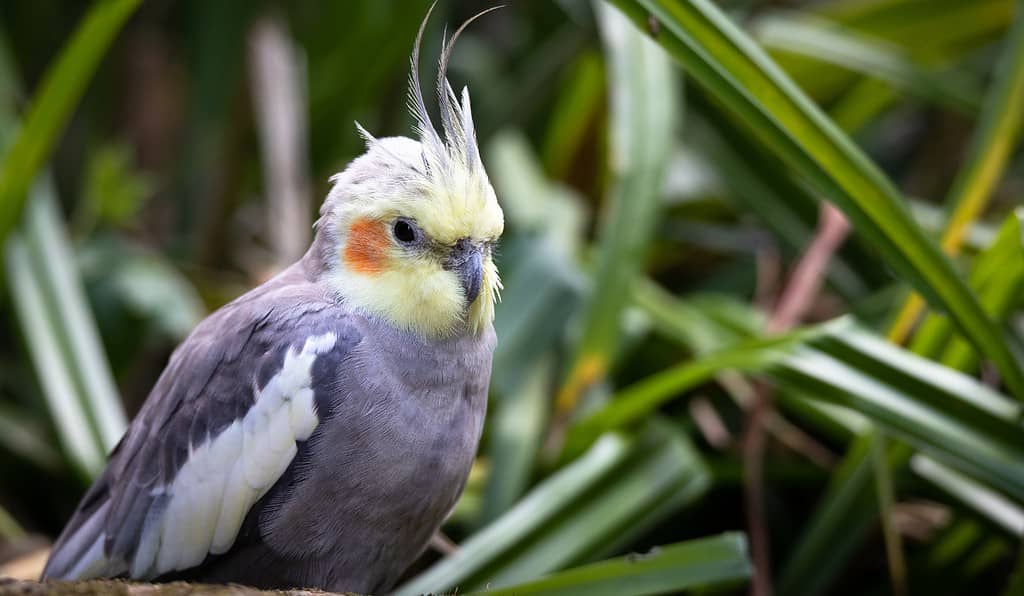
Cherries, with their vibrant hue and sweet taste, are a favorite among many. But have you ever wondered if these delightful fruits are safe for your chirpy cockatiel companion? As pet owners, we often find ourselves questioning the safety of various foods for our beloved pets, and cherries are no exception.
As a general rule, cherries can be a safe and nutritious treat for cockatiels when offered in moderation and prepared correctly, ensuring pits are removed and the fruit is washed thoroughly to eliminate any pesticide residues.
Curious about the specifics? Dive in as we explore the world of cockatiels and cherries, backed by expert insights and thorough research. Discover the dos, don’ts, and delicious ways to treat your feathered friend! 🍒🦜
An Overview of the Cockatiel Diet
Navigating the diverse dietary needs of cockatiels can be a journey, but understanding their natural preferences is the first step. Let’s delve deeper into what these charming birds thrive on and how we can best cater to their nutritional needs. Onward to a happy, chirpy, cherry-loving cockatiel! 🦜🍒
Natural Diet of Wild Cockatiels
In the wild, cockatiels primarily feast on:
- Various seeds, which provide them with essential nutrients.
- Grasses, which aid in their digestion.
- Occasional insects, offering them a protein boost.
- Seasonal fruits, giving them a mix of vitamins and minerals.
- Leafy greens, which are a source of many beneficial nutrients.
While domesticated cockatiels might not have the same diet as their wild counterparts, it’s essential to replicate it as closely as possible for their optimal health.
🍒 Tip: When introducing new foods to your cockatiel, always do so gradually and monitor their reaction.
Recommended Diet for Pet Cockatiels
Every bird owner wants the best for their pet, and ensuring a balanced diet is paramount. Here’s a breakdown of what a pet cockatiel’s diet should ideally consist of:
| Diet Component | Nutritional Value | Benefits |
| High-quality seed mix | Rich in essential fatty acids and proteins | Supports growth and maintains feather health |
| Fruits and vegetables | Packed with vitamins and minerals | Boosts immune system and aids digestion |
| Fortified pellets | Contains balanced nutrients | Ensures the bird gets all essential nutrients |
| Occasional treats | Varies based on the treat | Rewards and bonding moments |
Now, while cherries aren’t a staple in a cockatiel’s diet, many bird owners are curious about introducing them as a treat.
Do Cockatiels Like Cherries?
From my personal experience in guiding bird owners, it’s evident that cockatiels have a penchant for cherries. Their sweet and juicy nature makes them an instant hit among these birds. But the real question is, are they safe?
📌 Did You Know? Cockatiels are native to Australia and have been domesticated for over a century!
Are Cherries Safe for Cockatiels to Eat?

Cherries, when served correctly, can be a delightful treat for cockatiels. They’re not just tasty but also pack a punch in terms of nutrition.
Nutritional Benefits
| Nutrient | Found in Cherries | Benefits for Cockatiels |
| Vitamin C | High | Boosts the immune system and aids in wound healing |
| Anthocyanins | Present | Acts as antioxidants, protecting cells |
| Fiber | Moderate | Aids in digestion and promotes gut health |
| Potassium | High | Essential for heart health and muscle function |
| Melatonin | Trace amounts | Helps in regulating sleep cycles |
However, like all good things, cherries come with their set of precautions for our feathered friends.
🚫 Caution: Always ensure to remove cherry pits before serving them to your cockatiel. They contain trace amounts of cyanide which can be harmful.
Risks and Feeding Guidelines
- Choking hazard: Cherries, especially if given whole, can pose a choking risk. Always chop them into manageable pieces.
- High sugar content: While the natural sugars in cherries are beneficial, excessive consumption can lead to health issues. Moderation is key.
- Pit toxicity: Cherry pits contain trace amounts of cyanide. Always ensure to remove the pits before serving.
- Pesticide residues: Always wash cherries thoroughly before serving to remove any pesticide residues.
I’ve seen many bird owners introduce cherries to their cockatiel’s diet successfully. With the right precautions and moderation, cherries can be a delightful treat that your cockatiel will surely love!
How Much Cherries Should Cockatiels Eat?
When it comes to cherries, moderation is key. While cherries are packed with nutrients beneficial for cockatiels, they should not be the mainstay of their diet. Cherries and other fruits should only make up about 10% of a cockatiel’s daily intake. The rest should be a mix of pellets, vegetables, and other treats. Remember, even though cherries are nutritious, they won’t be enough on their own. It’s essential to maintain a balance to ensure your cockatiel gets all the nutrients it needs.
🍒 Did You Know? Cherries are not only delicious but are also rich in antioxidants, making them a healthy treat for both humans and birds!
Feeding Cherries to Cockatiels
Now that we’ve established the importance of moderation, let’s delve into the specifics of feeding cherries to your feathered friend. Preparing cherries for your cockatiel isn’t just about handing them a fruit; there’s a method to the madness!
Preparation and Serving Tips
- Washing the Cherries: Always start by thoroughly washing the cherries to remove any pesticides or contaminants.
- Removing Pits and Toxic Parts: Cherry pits contain trace amounts of cyanide, which is toxic for cockatiels. Ensure you remove them entirely.
- Chopping the Cherries: To prevent choking hazards, chop the cherries into manageable pieces suitable for your bird’s size.
- Moderation in Feeding: As tempting as it might be to give your cockatiel a handful of cherries, remember to feed them in moderation. Too many cherries can lead to obesity due to their high sugar content.
- Rotate with Other Fruits: Don’t let cherries be the only fruit your cockatiel enjoys. Rotate with other fruits like apples, pineapples, blueberries, and watermelons to provide a balanced diet.
Signs of Sensitivity or Allergies
- Monitoring Bird’s Droppings: Changes in the consistency or color of droppings can indicate sensitivity.
- Diarrhea: If your cockatiel experiences diarrhea after eating cherries, it might be best to limit or avoid them.
- Behavioral Changes: Watch out for any unusual behavior or signs of discomfort after feeding cherries.
🚫 Caution: Always monitor your cockatiel after introducing any new food to their diet. Their reactions can provide insights into any potential allergies or sensitivities.
Healthy Ways to Offer Cherries
| Method | Description | Benefits |
| Cherry Kebabs | Skewered pieces of cherry mixed with other fruits | Fun way to serve and encourages play |
| Fruit Salad | Mix of chopped cherries and other fruits | Provides variety and a mix of nutrients |
| Cherry Juice | Freshly squeezed cherry juice | Hydrating and packed with vitamins |
| Frozen Cherries | Chilled or frozen cherries served as a treat | Refreshing during hot days and adds a different texture |
| Dried Cherries | Dehydrated cherries without any additives | Crunchy treat, but remember it might lack some nutritional benefits of fresh cherries |
Are Wild Cherries Safe for Cockatiels?

Venturing into the wild to pick cherries might seem like a delightful idea, but when it comes to our feathered friends, there are a few things to consider. Wild cherries might not be as regulated as the ones you buy from a store, meaning they could have more pesticide residues or other environmental contaminants.
🌳 Did You Know? Wild cherries can vary in taste and size compared to cultivated ones. They might be smaller but can be more flavorful!
Differences between Cultivated and Wild Cherries:
- Cultivated Cherries: Grown under controlled conditions, ensuring they are free from harmful chemicals. Often washed and treated to remove pesticides.
- Wild Cherries: Exposed to various environmental factors, making them a bit riskier. Might contain higher pesticide residues.
- Taste and Texture: Wild cherries might have a slightly different taste and texture compared to cultivated ones.
- Nutritional Value: Both types offer similar nutritional benefits, but the exact content might vary based on soil and environmental conditions.
- Availability: While cultivated cherries are readily available in stores, wild cherries depend on the season and region.
I’ve always emphasized the importance of research and observation. While cherries can be a delightful treat for cockatiels, always ensure they are prepared safely and fed in moderation.
Signs of Illness After Eating Cherries
It’s essential to monitor your cockatiel after introducing any new food, including cherries. While cherries are generally safe, there’s always a slight risk of an adverse reaction.
| Symptoms | Potential Causes | Recommended Actions |
| Changes in droppings | Dietary changes or sensitivity | Monitor and consult a vet if it persists |
| Loss of appetite | Dislike for the food or digestive issues | Remove cherries and observe |
| Unusual behavior | Discomfort or pain | Consult a vet immediately |
| Diarrhea | Overfeeding or sensitivity | Limit cherry intake and ensure hydration |
| Lethargy | Possible allergic reaction | Seek immediate veterinary care |
🚫 Caution: Always be vigilant after introducing new foods. Quick action can prevent potential health issues.
Are Cockatiels Allergic to Cherries?
While it’s rare, cockatiels can have sensitivities or allergies to certain foods. Here’s what to look out for:
- Ruffled Feathers: A sign of discomfort or unease.
- Scratching or Itching: Could indicate skin irritation.
- Swelling: Especially around the eyes or beak, indicating a possible allergic reaction.
- Respiratory Distress: Wheezing or difficulty breathing is a severe sign and requires immediate attention.
If you notice any of these signs, it’s crucial to consult with a vet and possibly remove cherries from their diet.
Alternatives to Cherries for Cockatiels
If you find that cherries aren’t a hit with your cockatiel or you’re looking for some variety, there are plenty of other fruits to consider.
| Fruit | Benefits | Comparison to Cherries |
| Apples | Rich in fiber and vitamins | Less sweet, always remove seeds |
| Blueberries | Packed with antioxidants | Smaller and easier to feed |
| Pineapple | Contains bromelain, aiding digestion | Tangier taste |
| Mango | High in vitamin A | Tropical flavor, loved by many birds |
| Banana | Good source of potassium | Creamy texture, ensure it’s ripe |
🍎 Tip: Always introduce new fruits in small quantities and observe your cockatiel’s reaction.
Frequently Asked Questions
Can baby cockatiels eat cherries?
Absolutely! Baby cockatiels can enjoy cherries, but it’s crucial to serve them in moderation. Ensure the cherries are pitted and finely chopped to prevent any choking hazards. Introducing them slowly will also help gauge any sensitivities.
How many cherries can cockatiels eat?
While cherries are a delightful treat, it’s recommended to give cockatiels only one or two cherries at a time. This ensures they receive a varied and balanced diet, with cherries being just a tasty addition.
Do cockatiels like to eat cherries?
Yes, many cockatiels are fans of the sweet and juicy flavor of cherries. However, just like humans, individual cockatiels have their own taste preferences. It’s always fun to observe their reaction on their first bite!
Why do cockatiels throw up after eating cherries?
If a cockatiel throws up after eating cherries, it could be due to overfeeding or a sensitivity to the fruit. It’s essential to monitor their reaction and reduce or eliminate cherries from their diet if issues persist. Consulting a vet is always a wise step if you’re concerned.
Can cockatiels eat cherry stems?
While cherry stems aren’t inherently toxic to cockatiels, they can pose a choking risk. To ensure your bird’s safety, it’s best to remove the stems and serve only the cherry flesh.
Navigating the dietary intricacies of our feathered friends can be a delightful journey, especially when it comes to treats like cherries. As we’ve explored, cherries can indeed be a safe and nutritious addition to a cockatiel’s diet when offered with care and moderation. It’s all about striking the right balance and ensuring our chirpy companions get the best of what nature has to offer.
